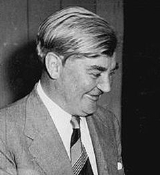
Labour Party
politician
who was the Deputy Leader of the Labour Party from 1959 until his death in 1960. The son of a coal miner, Bevan was a lifelong champion of social justice
and the rights of working people. He was a long-time Member of Parliament
(MP), representing Ebbw Vale for 31 years, and became recognised as one of the leaders of the party’s left wing, and of left-wing British thought generally.
The Labour Party should oppose the Government arms plan root and branch.![]()
What argument have they to persuade the young men to fight except merely in another squalid attempt to defend themselves against a redistribution of the international swag?![]()
Apparently some fire-eaters to-day have been saying "Never again must we allow ourselves to get into the same condition of military unprepardness, so we are going to build up a vast war machine in this country in order to surround defeated Germany with a sea of peaceful tranquillity..." It looks as though the consequences of defeat will be more desirable than those of victory.![]()
This island is made mainly of coal and surrounded by fish. Only an organizing genius could produce a shortage of coal and fish at the same time. ![]()
The language of priorities is the religion of socialism.![]()
There is only one hope for mankind — and that is democratic Socialism.![]()

